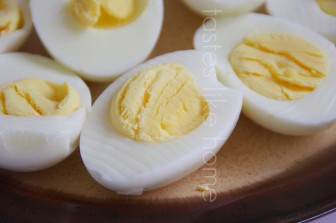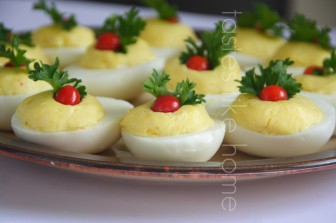Hi Everyone, Mention Devilled Eggs (aka Stuffed Eggs) for the menu of a social gathering these days and some people roll their eyes. “That is so yesterday,” they say. “They’re too old fashioned.” Others think they are tacky. However, put them on a buffet table, and they’re the first thing to disappear!
When I was growing up, a tea party without Stuffed Eggs on the menu meant that something was missing. Those pretty little white oval shapes of eggs stuffed with mounds of cheesy filling, richly yellow from the mustard, adorned with a sprig of parsley and dotted with a wiri wiri pepper. Oh how beautiful they looked on those platters. I do like stuffed eggs. While these days they can be filled with just about anything, I prefer the filling to be simple, just as my mom made it – egg yolks, cheese, mayonnaise, mustard, a little pepper sauce and a pinch of salt.
 Whether the tea gathering was at Sacred Heart Church or at home, my sister Pat and I always enjoyed helping out by making the Stuffed Eggs. Our reward was always that wayward egg or two that would not peel so perfectly and therefore could not make it to the prized platters of perfection. And invariably, there was always a little filling left over that we would use to make a couple of sandwiches for ourselves. So many little sunshine memories came flooding back last weekend as I made some Stuffed Eggs.
Whether the tea gathering was at Sacred Heart Church or at home, my sister Pat and I always enjoyed helping out by making the Stuffed Eggs. Our reward was always that wayward egg or two that would not peel so perfectly and therefore could not make it to the prized platters of perfection. And invariably, there was always a little filling left over that we would use to make a couple of sandwiches for ourselves. So many little sunshine memories came flooding back last weekend as I made some Stuffed Eggs.
Pat and I would work like an assembly line. Together we’d peel the eggs. Then one of us would halve the eggs while the other removed the yolks. I’d make the filling while she would carefully select and pluck the leaves of parsley. The peppers had to be uniform in size. With the filling mixed. I would stuff the eggs and she would garnish them. We’d stand back and admire our work. We worked well together. I miss my sister.
Stuffed Eggs or Devilled Eggs come from the days of old and were featured in medieval cookbooks. The word “devil” in food referred to dishes that were considered highly seasoned and hot from ingredients such as peppers, mustard, horseradish and spices. “Devilled” food was so called because it was often compared to the high heat in which the devil must live. Hence Devilled Eggs, Devilled Ham etc. We still reference the word today when we talk about heat. For example, “that pepper hot like hell!”
Making stuffed eggs are easy but here are a few pointers.
The eggs

Many people say that stale eggs make the best Devilled Eggs because when boiled they are easier to peel. Honestly, I have found that it doesn’t matter, but go with what you prefer. Stale eggs are eggs that are more than 9 days old.
Remove the eggs from the refrigerator and bring them up to room temperature before boiling them. If you put your eggs to boil straight from the fridge, you run the risk of the eggs cracking because of the shock from cold to heat. You also may end up with rubbery, overcooked egg white and yolks that are not fully cooked.
Add the eggs to a large pot so that they have adequate space to move and not bump into each other. Cover the eggs with water. Add a little salt to the water if you like (salt raises the temperature of boiling water) and it also seasons the whites a little -egg shells are porous. Now, everyone has their own formula for boiling eggs. Some people suggest bringing it to a boil over high heat and then removing the pan from the heat and letting it sit for 10 minutes. My method is to bring the eggs to a boil on medium high heat and boil for exactly 6 minutes.
Some people fuss about wanting the yolks of their boiled eggs to be centered because it makes them look perfect. It is not necessary that the yolks be centered for Devilled Eggs but if you want to be fussy about it, here are two things you can do – store the eggs point side down or store them on their side for at least 8 hours before cooking them.
Avoiding the gray sulphur ring
Whether you are making Stuffed Eggs or boiling eggs for any other preparation, you want to avoid the egg developing that ugly gray sulphur ring. To do this, immediately remove the eggs with a slotted spoon when they are done boiling and place them in a large bowl of ice-cold water. This stops the cooking process and prevents sulphur from developing. Sulphur rings around the yolks develop as a result of prolonged cooking of the eggs. Let the eggs cool down for 5 to 6 minutes before you crack, roll and start peeling the eggs.
Here’s a tip, if you want to have boiled eggs for a few days. As soon as you remove the eggs from the cold water, pat them dry and refrigerate them in their shells until you are ready to use them. They will last you up to a week.
The stuffing

When cutting the eggs in half, do not use a sawing motion, use a sharp knife and make a straight cut. Clean the knife of any yolk remnants as you slice through the eggs. This will avoid any flecks of yolk getting stuck on the edges of the egg whites.
While there are many recipes that advise that all the ingredients for the filling be mixed together at one time, I do not agree. The yolks really need to be mashed well, first. A potato masher, a hand mixer, even a food processor have been offered up as mashing tools but to date, I have found that nothing beats a sturdy fork and then I switch to a flat rubber spatula after I’ve added the other ingredients. Again, this is a situation where I want you to use which tool you feel most comfortable with to do this task. Remember your aim is for a creamy filling.
The filling should not be runny; it should be firm enough so that when you pull a spoon from the bowl, the filling holds peaks. This consistency allows for the filling to be piped into the egg whites or to be filled by spoon.
Garnishing
If I pipe my filling using a star nozzle, I do not bother garnishing my Devilled Eggs because they already look pretty. However, if I am filling it with a spoon and then smoothing the top, I garnish with a sprig of parsley and wiri wiri pepper. I always let people know that the pepper, though edible, is hot and is only there for garnishing. Some brave people have been known to pop the entire thing into their mouths – pepper and all.
Storing & Serving
Once stuffed, cover the eggs and refrigerate. Or, serve immediately. If you are planning on serving the eggs later the same day or the next day, you can opt to garnish just before serving.
You’re going to make some stuffed eggs now, aren’t you?
Devilled (Stuffed) Eggs
Yield: 12
Ingredients
6 eggs, room temperature
Water
Salt
½ cup finely grated cheddar cheese
2 tablespoons, plus 1 teaspoon mayonnaise
2 teaspoons Dijon mustard or regular mustard
½ teaspoon hot pepper sauce
12 small parsley leaves
12 small wiri wiri peppers
Directions
1. Add the eggs to a large pot, cover with water, add a 2 teaspoons of salt, cover pot, place on medium heat and bring to a boil. Once the pot comes to a boil, let cook for 6 minutes.
2. Meanwhile, fill a large bowl with ice cubes and water to make an ice-bath.
3. When the eggs are finished boiling, remove them with a slotted spoon and place into bowl with iced water. Let cool down for 5 – 6 minutes.
4. Remove eggs from iced water, tap on a hard surface to crack and roll, breaking shell. Peel and pat eggs dry.
5. Cut eggs in half, lengthways and remove the yolks.
6. Add yolks to a large bowl and using the back of a fork, mash until smooth.
7. Add cheese and continue to mash.
8. Add mayonnaise and pepper sauce and continue using the fork or switch to a flat rubber spatula and mix and mash until smooth. Taste for seasoning (salt) and add if necessary. The filling should be creamy; when you pull a spoon from the mixture, it should hold peaks.
9. Using a spoon, fill the eggs’ whites with filling at least ½ and inch above the surface the egg white. Pat smooth with your fingers.
10. Press parsley leaves into the centre of each stuffed egg, followed by the peppers.
11. Serve immediately or cover and refrigerate until ready to serve.
Note
Always add a couple extra eggs. This is to cater for those that crack while cooking or don’t peel smoothly.




